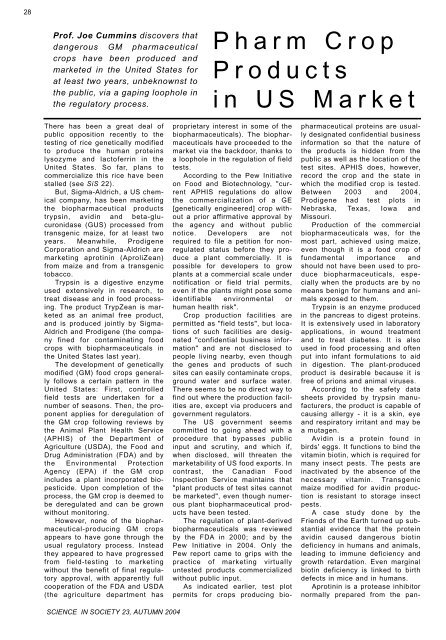Ethiopia goes organic to feed herself - The Institute of Science In ...
Ethiopia goes organic to feed herself - The Institute of Science In ...
Ethiopia goes organic to feed herself - The Institute of Science In ...
You also want an ePaper? Increase the reach of your titles
YUMPU automatically turns print PDFs into web optimized ePapers that Google loves.
28<br />
Pr<strong>of</strong>. Joe Cummins discovers that<br />
dangerous GM pharmaceutical<br />
crops have been produced and<br />
marketed in the United States for<br />
at least two years, unbeknownst <strong>to</strong><br />
the public, via a gaping loophole in<br />
the regula<strong>to</strong>ry process.<br />
Pharm Crop<br />
Products<br />
in US Market<br />
<strong>The</strong>re has been a great deal <strong>of</strong><br />
public opposition recently <strong>to</strong> the<br />
testing <strong>of</strong> rice genetically modified<br />
<strong>to</strong> produce the human proteins<br />
lysozyme and lac<strong>to</strong>ferrin in the<br />
United States. So far, plans <strong>to</strong><br />
commercialize this rice have been<br />
stalled (see SiS 22).<br />
But, Sigma-Aldrich, a US chemical<br />
company, has been marketing<br />
the biopharmaceutical products<br />
trypsin, avidin and beta-glucuronidase<br />
(GUS) processed from<br />
transgenic maize, for at least two<br />
years. Meanwhile, Prodigene<br />
Corporation and Sigma-Aldrich are<br />
marketing aprotinin (AproliZean)<br />
from maize and from a transgenic<br />
<strong>to</strong>bacco.<br />
Trypsin is a digestive enzyme<br />
used extensively in research, <strong>to</strong><br />
treat disease and in food processing.<br />
<strong>The</strong> product TrypZean is marketed<br />
as an animal free product,<br />
and is produced jointly by Sigma-<br />
Aldrich and Prodigene (the company<br />
fined for contaminating food<br />
crops with biopharmaceuticals in<br />
the United States last year).<br />
<strong>The</strong> development <strong>of</strong> genetically<br />
modified (GM) food crops generally<br />
follows a certain pattern in the<br />
United States: First, controlled<br />
field tests are undertaken for a<br />
number <strong>of</strong> seasons. <strong>The</strong>n, the proponent<br />
applies for deregulation <strong>of</strong><br />
the GM crop following reviews by<br />
the Animal Plant Health Service<br />
(APHIS) <strong>of</strong> the Department <strong>of</strong><br />
Agriculture (USDA), the Food and<br />
Drug Administration (FDA) and by<br />
the Environmental Protection<br />
Agency (EPA) if the GM crop<br />
includes a plant incorporated biopesticide.<br />
Upon completion <strong>of</strong> the<br />
process, the GM crop is deemed <strong>to</strong><br />
be deregulated and can be grown<br />
without moni<strong>to</strong>ring.<br />
However, none <strong>of</strong> the biopharmaceutical-producing<br />
GM crops<br />
appears <strong>to</strong> have gone through the<br />
usual regula<strong>to</strong>ry process. <strong>In</strong>stead<br />
they appeared <strong>to</strong> have progressed<br />
from field-testing <strong>to</strong> marketing<br />
without the benefit <strong>of</strong> final regula<strong>to</strong>ry<br />
approval, with apparently full<br />
cooperation <strong>of</strong> the FDA and USDA<br />
(the agriculture department has<br />
proprietary interest in some <strong>of</strong> the<br />
biopharmaceuticals). <strong>The</strong> biopharmaceuticals<br />
have proceeded <strong>to</strong> the<br />
market via the backdoor, thanks <strong>to</strong><br />
a loophole in the regulation <strong>of</strong> field<br />
tests.<br />
According <strong>to</strong> the Pew <strong>In</strong>itiative<br />
on Food and Biotechnology, "current<br />
APHIS regulations do allow<br />
the commercialization <strong>of</strong> a GE<br />
[genetically engineered] crop without<br />
a prior affirmative approval by<br />
the agency and without public<br />
notice. Developers are not<br />
required <strong>to</strong> file a petition for nonregulated<br />
status before they produce<br />
a plant commercially. It is<br />
possible for developers <strong>to</strong> grow<br />
plants at a commercial scale under<br />
notification or field trial permits,<br />
even if the plants might pose some<br />
identifiable environmental or<br />
human health risk".<br />
Crop production facilities are<br />
permitted as "field tests", but locations<br />
<strong>of</strong> such facilities are designated<br />
"confidential business information"<br />
and are not disclosed <strong>to</strong><br />
people living nearby, even though<br />
the genes and products <strong>of</strong> such<br />
sites can easily contaminate crops,<br />
ground water and surface water.<br />
<strong>The</strong>re seems <strong>to</strong> be no direct way <strong>to</strong><br />
find out where the production facilities<br />
are, except via producers and<br />
government regula<strong>to</strong>rs.<br />
<strong>The</strong> US government seems<br />
committed <strong>to</strong> going ahead with a<br />
procedure that bypasses public<br />
input and scrutiny, and which if,<br />
when disclosed, will threaten the<br />
marketability <strong>of</strong> US food exports. <strong>In</strong><br />
contrast, the Canadian Food<br />
<strong>In</strong>spection Service maintains that<br />
"plant products <strong>of</strong> test sites cannot<br />
be marketed", even though numerous<br />
plant biopharmaceutical products<br />
have been tested.<br />
<strong>The</strong> regulation <strong>of</strong> plant-derived<br />
biopharmaceuticals was reviewed<br />
by the FDA in 2000; and by the<br />
Pew <strong>In</strong>itiative in 2004. Only the<br />
Pew report came <strong>to</strong> grips with the<br />
practice <strong>of</strong> marketing virtually<br />
untested products commercialized<br />
without public input.<br />
As indicated earlier, test plot<br />
permits for crops producing biopharmaceutical<br />
proteins are usually<br />
designated confidential business<br />
information so that the nature <strong>of</strong><br />
the products is hidden from the<br />
public as well as the location <strong>of</strong> the<br />
test sites. APHIS does, however,<br />
record the crop and the state in<br />
which the modified crop is tested.<br />
Between 2003 and 2004,<br />
Prodigene had test plots in<br />
Nebraska, Texas, Iowa and<br />
Missouri.<br />
Production <strong>of</strong> the commercial<br />
biopharmaceuticals was, for the<br />
most part, achieved using maize,<br />
even though it is a food crop <strong>of</strong><br />
fundamental importance and<br />
should not have been used <strong>to</strong> produce<br />
biopharmaceuticals, especially<br />
when the products are by no<br />
means benign for humans and animals<br />
exposed <strong>to</strong> them.<br />
Trypsin is an enzyme produced<br />
in the pancreas <strong>to</strong> digest proteins.<br />
It is extensively used in labora<strong>to</strong>ry<br />
applications, in wound treatment<br />
and <strong>to</strong> treat diabetes. It is also<br />
used in food processing and <strong>of</strong>ten<br />
put in<strong>to</strong> infant formulations <strong>to</strong> aid<br />
in digestion. <strong>The</strong> plant-produced<br />
product is desirable because it is<br />
free <strong>of</strong> prions and animal viruses.<br />
According <strong>to</strong> the safety data<br />
sheets provided by trypsin manufacturers,<br />
the product is capable <strong>of</strong><br />
causing allergy - it is a skin, eye<br />
and respira<strong>to</strong>ry irritant and may be<br />
a mutagen.<br />
Avidin is a protein found in<br />
birds' eggs. It functions <strong>to</strong> bind the<br />
vitamin biotin, which is required for<br />
many insect pests. <strong>The</strong> pests are<br />
inactivated by the absence <strong>of</strong> the<br />
necessary vitamin. Transgenic<br />
maize modified for avidin production<br />
is resistant <strong>to</strong> s<strong>to</strong>rage insect<br />
pests.<br />
A case study done by the<br />
Friends <strong>of</strong> the Earth turned up substantial<br />
evidence that the protein<br />
avidin caused dangerous biotin<br />
deficiency in humans and animals,<br />
leading <strong>to</strong> immune deficiency and<br />
growth retardation. Even marginal<br />
biotin deficiency is linked <strong>to</strong> birth<br />
defects in mice and in humans.<br />
Aprotinin is a protease inhibi<strong>to</strong>r<br />
normally prepared from the pan-<br />
SCIENCE IN SOCIETY 23, AUTUMN 2004











